








Photojournalism students captured images across campus (and off) for this issue of Collegian. This was their first time out covering happenings, including a Club Rush, and Wellness Wednesday event.
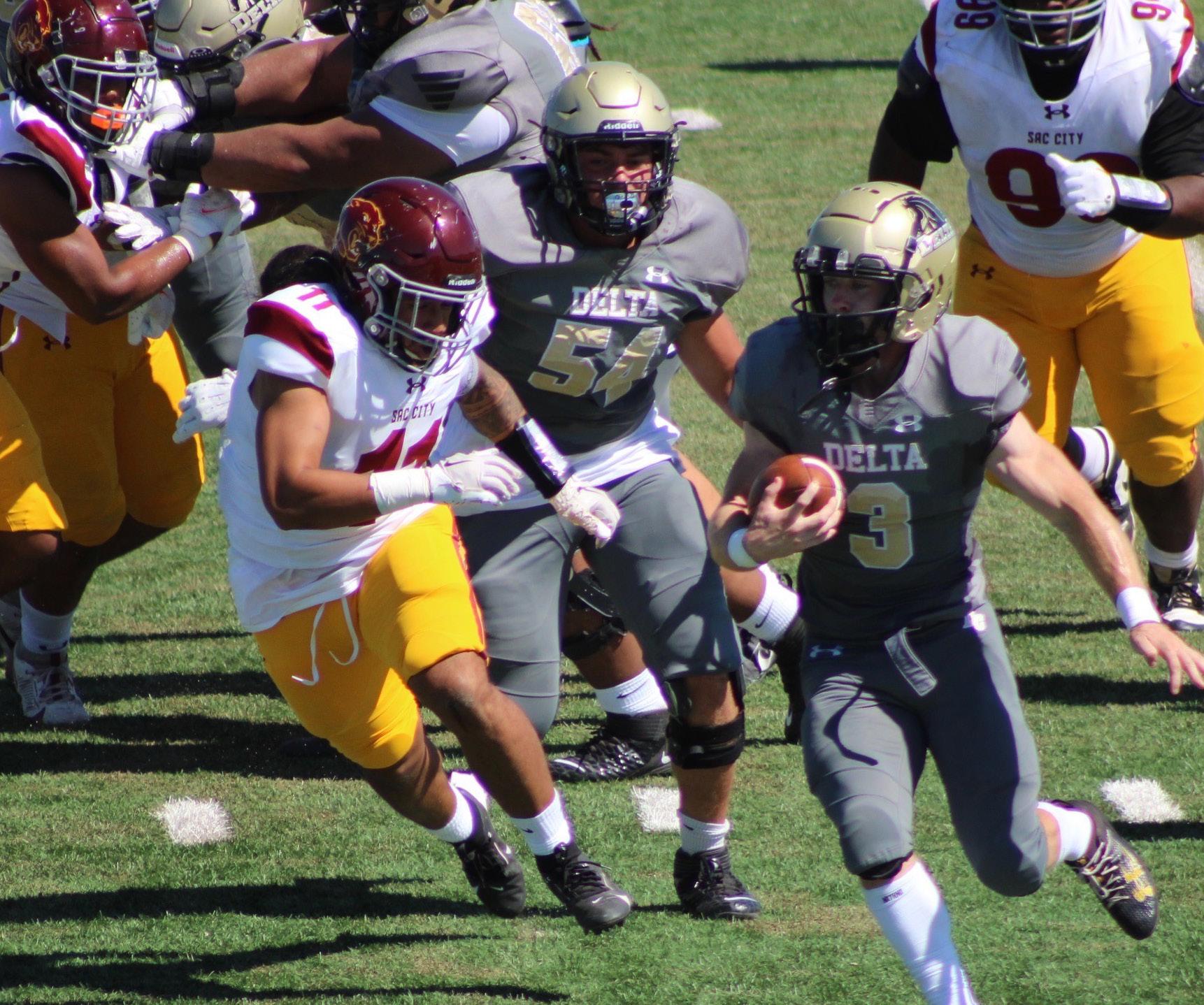
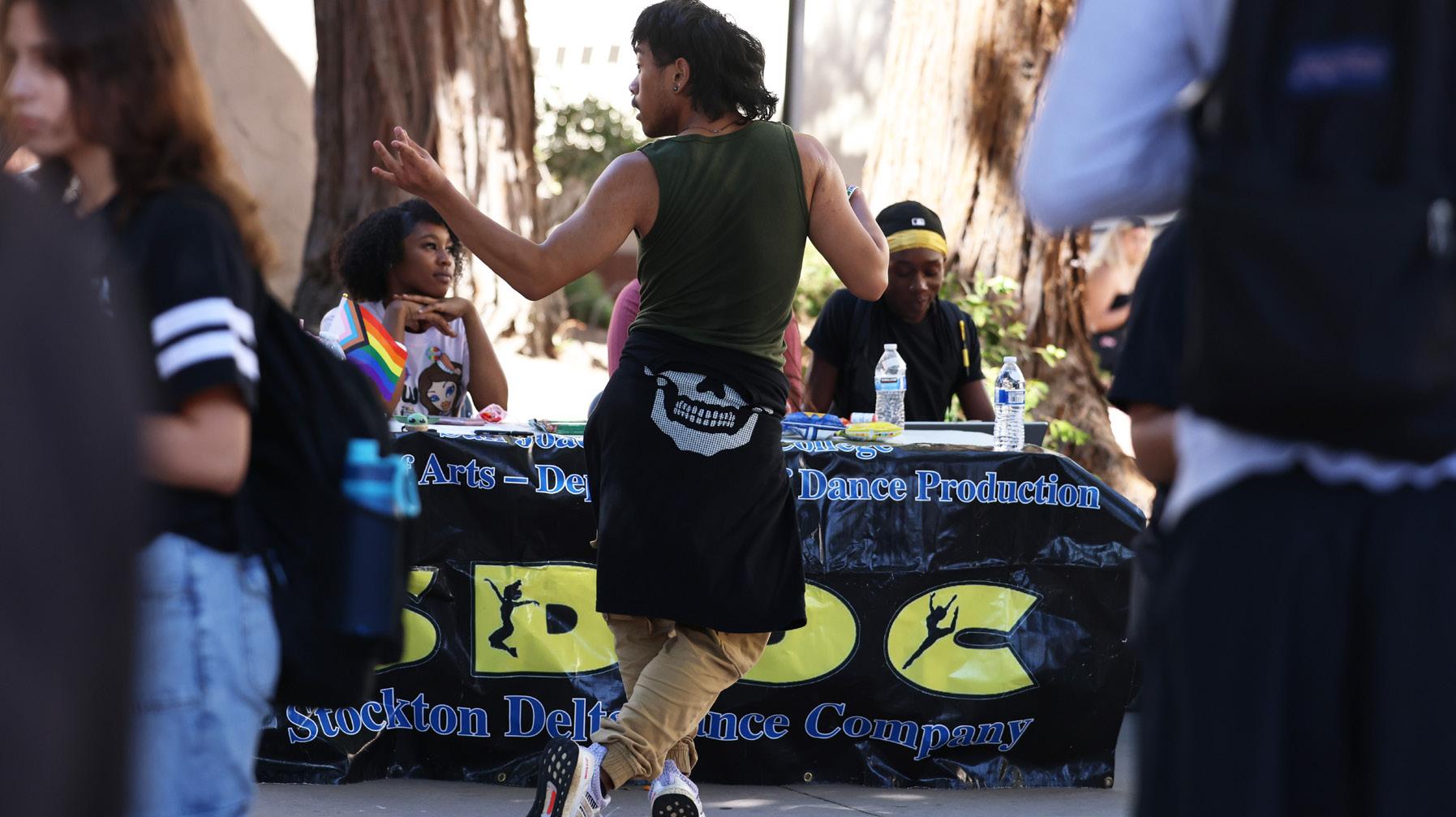
: Kaiden Merryman (3) sophomore running back cuts free outside caused by freshman offensive tackle Stephen Holbo’s (54) block on Sacramento City’s sophomore linebacker Farani Vaa (11) on Sept. 14 at McNair High School in Stockton.
Correction: The captions for two photos with the Sept. 6 article “Delta opens annual Visions in Clay exhibition” on page 9 were inadvertently switched. The caption should read “Top Left: Chidi Ukwuoma and his piece ‘Once in a Lifetime.’ Top Right: Freddy Santana and his piece ‘Pensado en el Future.’”
The Collegian is the student newspaper of San Joaquin Delta College in Stockton, Calif. The paper is published six times a semester.
As a First Amendment newspaper we pride ourselves on a commitment to the students of Delta College while maintaining independence.
We reinvigorate the credo that the newspaper speaks for the students, checks abuses of power and stands vigilant in the protection of democracy and free speech.


The
Correction: The athletics field construction project was approved to use a design-build process in September 2022. The process was incorrectly named in the Sept. 6 article “Work began in summer on athletic fields” on page 12.
ANDREA
Editor-in-Chief
ZACKARY KIRK-NEWTON Managing Editor/Entertainment JELISSA
SENIOR
LORIANA JOSE
WILLIAMS JR.
CYNTHIA AGUILAR MIKAELA CABANG LAYLA CARRASCO JESSICA CHHABRA YUICHI
MARCO VARGAS
TINDELL
BY ANDREA RIVERA Editor-in-Chief
Internet connection issues at Delta’s campus have left students and staff frustrated at the start of the Fall semester.
“I always try to be on campus to do my homework, but since the Wi-Fi’s not working, that makes me lose my motivation,” said student Natalie Thao.
Student Anthony Sanchez agreed.
“I feel like it has no connection, honestly. I’m currently using my phone’s hotspot,” said Sanchez. “I’ll connect my phone and it’ll say it’s connected but it doesn’t work.”
When he can’t connect on campus, Sanchez said he has to leave campus and go to nearby businesses such as Empresso because the Wi-Fi is free and fast.
Frustrations related to the on-andoff again Internet issues are bubbling over in public ways, with public comment at two most recent board meetings equating the situation to the sinking of the Titanic at the Sept. 3 meeting and the reading of a resolution seeking “immediate action to resolve the consistent lack of Internet connectivity, lack of Internet capacity and slow Internet speeds,” at the Sept. 10 meeting.
“Clearly this is a problem and we acknowledge that and it is really, really important that we provide reliable internet for students and for employees here,” Director of Marketing and Communications Alex Breitler said via email.
Professors have been fighting with the slow internet to no inernet connection as well during classes making it challenging to do their jobs.
Specifically HyFlex courses, classes that are available for in-person as well as asynchronous live lecture, have seen the most impact causing delays in assignments and postponing class for students who can not access the Zoom links or to watch the lecture later.
Digital Media Professor Adriana Brogger, who teaches HyFlex classes said she has experienced many issues with the Wi-Fi and has used Delta’s Information Technology department’s online ticketing system to come out and fix her connection but has still experienced slow connections.
“For a week it was happening pretty much daily. We were putting in phone
calls, or an IT work ticket … When I spoke publicly, I did have a response that had them showing up into our physical space, and surveying the situation and then to try to help us by installing access points, and giving us hardwired ethernet connections,” said Brogger, who made comments at a meeting of the President’s Council on Sept. 5.
Brogger also said she has had to delay due dates and be fair to her students that can’t finish her assignments due to the poor connection on campus and ongoing lab connection issues.
“There were a couple of days where I actually shutdown the lab because even when I was working from my office and my lab tech was working from his workspace, neither one of us were able to use the internet. We even tried to use our phones as hotspots, it was just a more efficient day to work from home,” said Brogger.
PANTRY IMPACTED
Internet connection issues have also impacted Delta’s Student Food Pantry.
The pantry provides food for enrolled students who have completed the online Food Pantry application, which is supposed to give you access for the entire year. However, without a stable internet connection the staff has been working off of an honor system and writing individual applications by hand, to later enter in the data whenever WiFi comes back up.
Acting Student Programs Assistant for the Food Pantry Valerie Valera said the pantry is “backlogged to the max. We are having trouble to verify students so they can use the food pantry, so far we’ve been trying to do like honor code. But that hasn’t really been working out for us.”
The issues extend to more than just serving students, too.
“So we have 100 students that come in, who haven’t completed our application. So that messes with our reporting we have to do every month,” said Valera. “Our reports get kind of skewed, because I actually report to a nonprofit organization, Second Harvest, and they report to the county. Not getting the accurate numbers needed for reporting we won’t have like the support to help the food pantry get stocked.”
Valera has also checked out a hotspot that Delta College provides to attempt
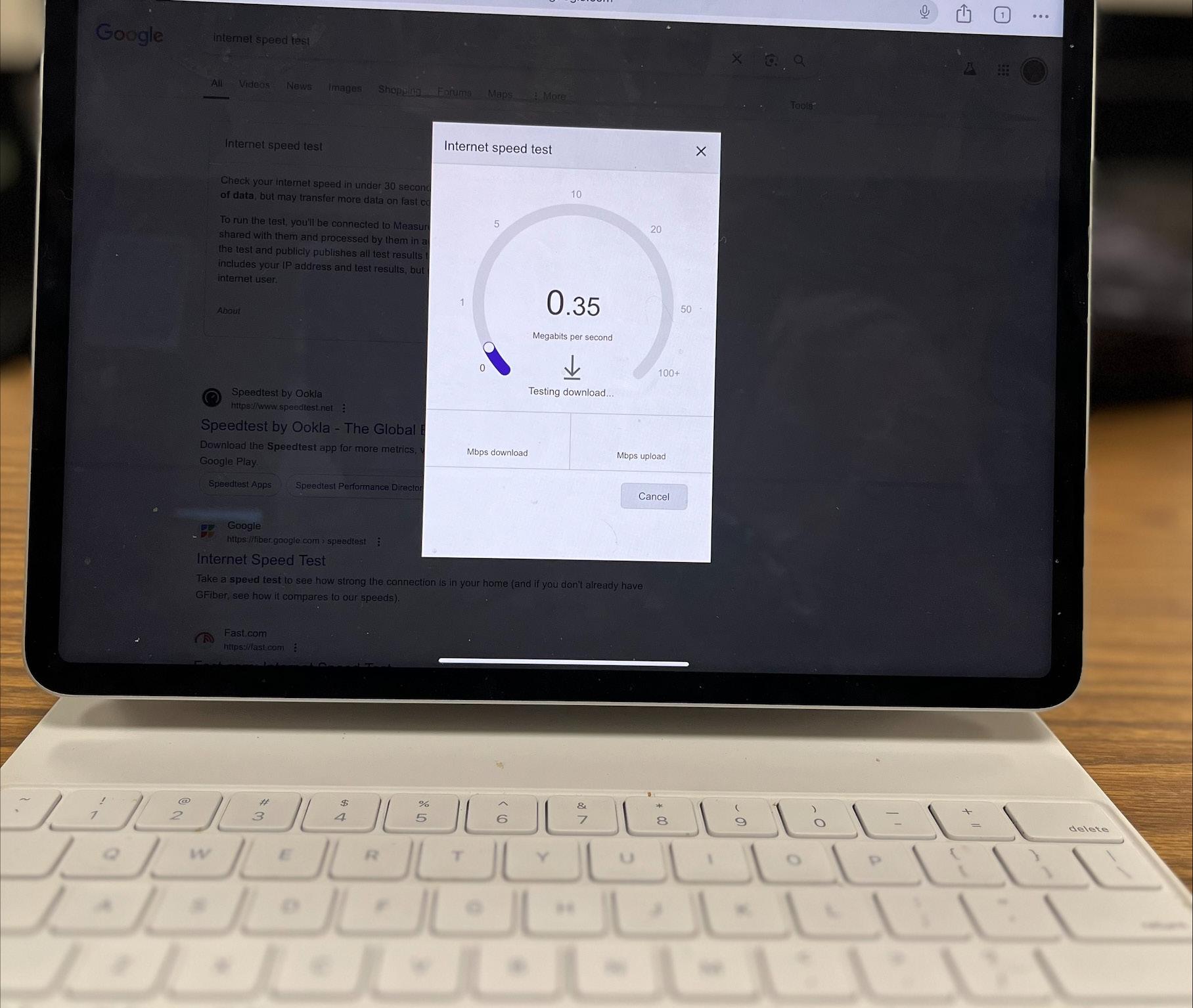
to fix the problem, but the hotspot could not connect either.
Breitler has said in an email interview the college is “aware of the challenges at the food pantry, and Information Technology is working with them on a solution specific to their area... I understand that the food pantry has seen an influx of students this fall and we definitely want to make sure that the pantry is able to operate effectively.”
Past efforts were made to try and improve the connections before COVID according to Breitler in an email, “we’ve been working on this issue for a number of years. The construction of a new data center using Measure L funding established a modern hub for our network, and a subsequent project laid fiber optic cables from the data center to the buildings across campus. However there is still a lot of work to be done to bring this infrastructure up into the walls of the buildings themselves.”
The issues were brought to the attention of the Delta College board members in a public comment at the Sept. 3 board meeting by Dr. Harry Mersmann.
“I’m here to tell you right now that the ship is sinking, and it’s sinking because the Internet on this campus is failing on a regular basis,” said Mersmann. “We have classes and faculty that are dismissing classes because they can’t get online
to do the things that need to be done in the classroom…Sometimes I get told by certain board members that they don’t necessarily know what’s going on. I just need you to know what’s going on. We’re struggling, we’re struggling. It’s really really dire. The Titanic’s going down.”
At the Sept. 4 Academic Senate meeting the group passed a resolution presented by Professor/Counselor Becky Plaza with intent to take “ immediate action” on the issue. Concerns had been raised before, but attempts to fix it were “inadequate or ineffective,” said Plaza.
Plaza also spoke about how Delta College needs to bring a reliable internet service provider, conduct a thorough assessment of the current internet and physical infrastructure, engage in expert support with external IT experts or consultants, have a plan to address and fix the issues with specific timelines for the restoration of reliable, and implement regular updates to all campus constituencies.
Plaza read the resolution, passed by the Academic Senate, at the Sept. 10 board meeting.
By Sept. 5, Breitler sent a campus wide email on behalf of the Information Technology department to explain what was believed to be the problem,
BY JELISSA KING News Editor
In March 2004, San Joaquin County tax-pay ers voted yes for Delta College’s Measure L bond. Delta received $250 million to help with campus upgrades and ex pansion.
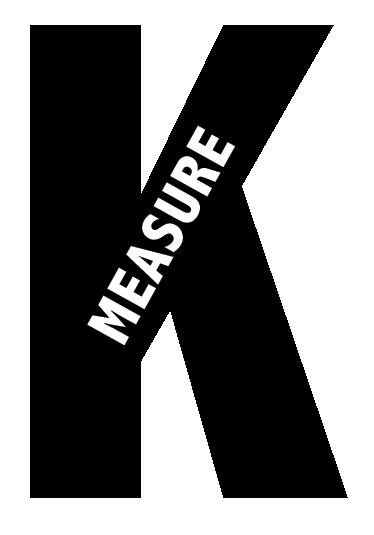
The major Measure L projects brought campus portables to Mountain House, built the Science and Mathematics build ing, demolished Cun ningham, which included the planetarium, funded renovations on the Gole man Library and multiple updates to the athletic field.
For Nov. 5, 2024, Delta proposes Measure K for the ballot. This bond is double the amount, making it $598 million.
The bond project will help remove asbestos, provide drinking water, upgrade job training, in crease accessibility to higher education, prepare for students transferring to four-year universi ties and improve campus safety.

MEASURE K TO-DO LIST
SAN JOAQUIN COUNTY VOTES YES

This is part two of the Measure K report series. This checklist previews the history of Measure L and compares it to the potential Measure K bond.
REMOVE ASBSETOS, MOLD AND LEAD PAINT
PROVIDE CLEAN DRINKING WATER

MEASURE L BALLOT LANGUAGE
STOCKTON, MANTECA, TRACY, LODI/GALT, FOOTHILL AREA CAMPUSES/ EDUCATION CENTERS GET MEASURE K ON THE BALLOT FOR NOV. 5, 2024 REMOVING ASBETOS

continued from PAGE 3
describing the proposal that will be implemented by the district for the solutions to fix the internet. Employees were asked to “minimize network usage during peak hours, using wired ethernet connections whenever possible, and only using Wi-Fi when mobility is needed.”
“An increase in the number of students on campus and the growing number of electronic devices used by both students and employees is straining our system … Additionally, we need to identify the areas of instruction that rely heavily on technology. If you are experiencing ongoing issues in a highly technology-dependent area, please submit a ticket with detailed information. The more specifics you provide, the better we can assist you,” the campus memo from

REMOVING ASBSETOS
Proposedin2005... DELAYED (Until further notice)
• ValleySprings(Coe FamilyProperty)
PROJECT: Satellite North Campus AUDIT REPORT : 2006-2008
UPGRADE JOB TRAINING AND VOCATIONAL CLASSROOMS
• Galt(LibertyRoad)
• Lodi (Victor Road)
MEASURE L CHECKLIST
toAuditReportleads Grand Jury Reportleadingto projectdelays
INCREASE LOCAL, AFFORDABLE ACCESS TO HIGHER EDUCATION
PROJECT: Math & Science Building Priority
CunninghamDemolition (Proposedin2004,officially started 2010)
• BuildingSCMACenter(2010)
IMPROVE STUDENT SAFETY ON CAMPUS
• UpgradeCleverPlanetarium
• Taisei Construction sues Delta •D(2013) elta countersues Taisei •Delta & Taisei sues Kitchell Construction - 2016 (KitchellPhaseworkshalfwayonPathways III)
•Planetarium Demolition (2014)


PathwaysGolemonProjects:Library
PREPARE STUDENTS FOR TRANSIT TO FOUR-YEAR COLLEGES AND UNIVERSITIES
Project
Upcoming Projects: Mountain House DeRiccoCampus(Portables) Student Services Athletic Fields - 2005 (Current) Mountain House Expansion (Delayed until further notice)
Breitler stated.
From Sept. 9-13, Breitler said the IT department began a network assessment. The IT department walked campus with consultants assisting them in figuring out the immediate solutions and longer term planning.
“It’s a major project. This is one of the things that we have talking about with Measure K and how the IT infrastructure would definitely be a priority if Measure K is approved. It’s a priority either way. But if the bond is approved, and we have the access to those funds, fixing IT infrastructure, doing those upgrades would be a very high priority project for us with the bond,” said Breitler.
During the Sept. 10 board meeting, the Executive
Director of Information Technology Scott Quick was noted in board documentation as resigning from his position.
Assistant Director of Systems Development Christopher Kirschenman and Assistant Director of Information Technology Services David Marciel Jr. are now in charge of investigating the connectivity issues on campus.
Collegian reached out to both directors. Kirschenman said the two wouldn’t have time for an interview during the week, which coincided with the network assessment, and referred questions to Breitler.
“We have two very capable and very hard-working assistant directors of IT. And they are the ones who offered to go around and meet the faculty one-on-on to address concerns in particular areas,” said Breitler.
BY ANDREA BALTODANO Staff Writer
Delta College is focusing on non-voter student engagement as part of its participation in the 2024 California University and College Ballot Bowl, with Associated Students for Delta College (ASDC) and Dreamers Success Center partnering to focus on civic engagement beyond casting a ballot.
The Ballot Bowl is a state-level competition organized by the California Secretary of State’s office that encourages colleges and universities to boost voter registration and civic engagement among students.
While the initiative stimulates friendly competition between campuses to increase voter participation, for many immigrant students at Delta the event raises concerns because they’re unable to make political decisions, despite being directly impacted by those decisions.
The partnership of the Student Life office and Dreamers Success Center is designed to empower all students, regardless of immigration status and foster a sense of involvement and participation in shaping their community.
“A good example of engaging even if you’re not voting is emailing your representatives. They still represent you since you live in that area,” said Layla Alaswad, ASDC Vice President of Student Affairs during
Club Rush.
The heart of these efforts aim to involve the non-voter student population in civic activities. While the Dreamers Success Center is frequently busy with students seeking support, many are also looking for ways to make changes in the community despite an inability to cast a ballot.
“We are collaborating with Student Life to spread the information that voting is happening. Yes, you might not be able to vote but you have family and people that can vote, so let’s educate you guys so you can educate active voters and make an impact,” said the Dreamers Success Center’s resource specialist, Tina Leal.
Leal highlighted the upcoming Undocumented Student Action Week that will be taking place from Oct. 14 through Oct. 17. This statewide event was created by California Community Colleges to raise awareness about the challenges that undocumented students have to face and to promote discussions around local, state and federal solutions.
This initiative also seeks to build a strong, collaborative system that supports student success, breaking down silos and promoting a unified campus approach. Delta College will join other institutions in championing the needs of its undocumented student population during this important week of advocacy and action.

BY ZACKARY KIRK-NEWTON Managing Editor
Four seats on the board of trustees are on the ballot this election season, area 5 which has the incumbent Dr. Armando Valerio running unopposed and area 6 which is a race between Catalina Piña and Rosario Patrick. While one of them might not be a particularly close race they will both certainly have a big impact on the future of Delta College.
ees.com.) “My 28-year career in IT Architect has prepared me with the work ethic and knowledge to help prepare our youth for a bright future.”
Patrick’s appeal to voters emphasizes the importance of education and his own ties to it.
“What makes us unique, compared to other areas, we’re considered Bay Area now and that poses a problem now because a lot of our student’s parents are Bay Area and that means a lot of travel,” said Piña, one of the candidates for Area 6, regarding what unique problems were facing Area 6. “There should be an extension of Delta in Tracy, It’s a population of 10,000.”
Piña, who currently teaches high school spanish for Tracy Unified School District , said her experience had prepared her to serve as a trustee.
“I’ve been in education for 24 years, my doctorate is in education leadership, and I teach at the high school level,” said Piña. “I worked at Cal State Fullerton, I was on several advisory boards for the local community colleges.”
The decision to run is the “next step.”
“Those experiences are what planted the seed so to speak,” Piña said. “I love what I do, it’s very fulfilling ... but I have this need to do more,”
Patrick, a self described IT architect is the other candidate running for Area 6, was unable to be reached for comment.
“I like emphasizing education because it is the key to success and has taken many men and women to greater heights in life,” reads Patrick’s website, (https://rosario4trust -
“Education makes a difference in fragile or forced rebuilding communities and can help with emotional growth, aiding people in overcoming trauma due to entrenched discrimination, conflict, war, or natural disasters by providing stability and hope, “the website reads as well as explaining his ties to education. “My parents were teachers, so they instilled in me the value of education and the necessity of protecting our educational system for our community’s future at a young age.”
For Area 5, the issue of representation was also important.
“It’s been a huge learning experience for me,” said Valerio regarding his temporary appointment to the board of trustees in May of this year after former trustee Kathy Garcia vacated her seat on the board. “It’s like learning a new language”
“When I was 14, I went to Delta College with my mom, she was taking night classes,” said Valerio. “I would go study in the Goleman Library, I got my AA here and took a few adult learning courses.”
Valerio is running for the Area 5 seat in this year’s election. While the outcome of this race may be a foregone conclusion, he is still eager to discuss what he brings to the table.
“I want to have representation for my area,” he said, adding that he believes a huge issue facing Area 5, which serves Lockeford and Clay in eastern San Joaquin County as well as Calaveras County, is the sheer amount of distance the students have to travel. A student from Calaveras could expect an hour and a half drive into the main campus according to google maps. “The distance, there is nothing close to Calaveras county, that was something that was supposed to be addressed with Measure L,” he said.
BY ASHLEY HALLINAN Staff Writer
The Associated Students of Delta College’s (ASDC)Food 4 Thought program returned for the Fall 2024 semester on Monday, Sept.9.
Food 4 Thought is a weekly free lunch offered on Mondays from 12 to 1 p.m. near Danner Hall.
In previous semesters, the Food 4 Thought free lunches were only available for Mustang Pass holders. A new aspect of the program is that it’s available to all Delta students in exchange for a quick survey to aid ASDC in understanding the wants and needs of the student body.
“Food 4 Thought is ASDC’s way to give back to the students with free food in return for their experiences on campus. The purpose is to reach out to students about their opinions regarding important issues through short surveys and in compensation they receive food,” said ASDC Vice President, Layla Alaswad. “For students, I want them to know that their input when it
comes to these surveys is both completely anonymous and only gets sent to us. We use their survey input to create goals for ASDC.”
Delta student Alexander Feaster participated in the Food 4 Thought event on Monday, Sept. 16 with several friends after hearing about it as an announcement in one of his classes.
“I think it is a wonderful program helping to provide lunch to students who may not exactly have anything for lunch,” Feaster said when asked about his opinion on the program.
Another important ASDC program is the Mustang Pass.
“The Mustang Pass is a combination of two fees, Student Activity Fee and Student Representation Fee,” said Alaswad. “The money from the Mustang Pass goes straight to ASDC and helps us fund us.
The Mustang pass gives you free food at every College Hour event run by us, discounts at certain businesses listed on our website, and scholarship opportuni -

ties. The newest change to the Mustang Pass is the combination of the Student Representation Fee. This change is to simplify the process of paying these fees since both fees are received by us.”
Alaswad continued:
“The huge thing I want to emphasize to students is that not only does this money fund us, but as your representatives you can tell us how you want
your money to be spent! We want students to be active with the way their money is used, either through projects they want ASDC to fight for or the events they want to see be done on campus. ASDC really appreciates the students paying for the Mustang Pass as it helps keep ASDC alive and allows us to plan these great events!”
Mustang Passes are
available to all students with a fee of $12.
“They can purchase at the Office of Student Life or at the Cashier’s Office,” said Director of Student Life, Dr. Ricky Gutierrez-Maldonado.
“They may pay for the fees online as well and simply show proof of payment at the above named offices and get a Mustang Pass Sticker.”
Guiterrez-Maldonado added “Fees from
the Mustang Pass help support campus life events, activities, funds clubs and does so much more. It’s the way everyone can chip in to make Delta College a better place for every student.” If students want to be a part of contributing or helping plan campus life events, they can request to join the campus life committee currently meeting every Monday, from 1 to 2 p.m.
BY JOSH SIMAS Senior Staff Writer
On Sept. 10, the 2024 presidential debate took place. As we draw nearer to the election the question of who to vote for is beginning to weigh more on people’s minds.
The debate itself was something of a spectacle, with talks of plans and policies from both candidates as well as fact checking, lots of fact checking.
Roe v. Wade was a big point of discussion early on with Vice President Harris making promises to overturn the abortion ban once she’s elected.
“I really enjoyed when Kamala Harris started talking about the personal stories of other women and how the ban affected them,” said Delta student, Angelina Aguayo.
Aguayo said she knew before the debate that she was going to vote for the Vice President due to her support of abortion rights as well as her plan for first time home owners and support for small businesses.
“When it comes down to it I think Kamala does things ethically and Trump does things for what he believes will make America stronger even though it may not be morally right,”
said Delta student, Millie Jacobo. Jacobo said that she identifies as a democrat and also intends to vote for Harris.
“I think it’s important to vote because to be honest, why not? If there is a candidate who you feel is a better fit for your needs, lifestyle, family, then you should do so.”
On Sept. 17, Delta held a voting registration in the quad for National Voter Registration Day.
Many students came out to register, receiving T-shirts and bags of popcorn once they had. Delta student Francisco Peralta, a self identified independent,
was one such student.
Peralta said he believes it’s important to vote “because people’s opinions need to be heard, people need to be able to choose what they want.”
Daniel Hernandez was there with the Office of Student Life, talking to students about the importance of voting and also giving out stickers and pins.
“My position here is pushing or empowering students to vote, they are the voters of tomorrow. Their concern about what’s going on currently, their voice is what’s gonna dictate what’s gonna be happening in the future,” Hernandez said.
BY LEVI GOERZEN Staff Writer
The Student Chef program at Delta College launched a new takeout program this semester called the Mustang Café alongside the dine in option.
The Student Chef program has been a fixture on the Delta College campus since 1992. Student Chef opened for the 2024 Fall semester on Wednesday, Sept. 11. The new take-out Café model, the Mustang Café also opened to service that day.
“The Mustang Café in particular is a place where students can try out recipes and concepts that they want to see in our community,” said Associate Professor of Culinary Arts Andrew Griggs. “It gives them a chance to practice those skills and hopefully open up businesses locally.”
Another new change for the semester is card-only payments for both the Café and the restaurant.
Getting a chance to work in a restaurant style environment is important to learning and developing skills as a chef.
Mario Rodriguez, a Delta
student who has had prior experience in a restaurant, said that this is one of the most important parts of the culinary program at Delta.
“Classes like this are as close as you can get,” said Rodriguez. “For someone who wants to do culinary, who wants to work in a restaurant, a Student Chef is completely necessary to understand restaurant life.”
Rodriguez wasn’t the only student chef that felt this way.
Third year student Noah Yang said that this was one of the best experiences he has had in the culinary program and it’s a vital part of learning the culinary arts.
The staff and student body had positive views on the program, Delta student Steven Cole shared his thoughts on the affordable pricing: “Where else can you get a loaded baked potato for $7?”
Art Gallery Coordinator Jan Marlese said she has been coming to the program for the past 17 years and appreciates the impact it has on the community.
Marlese also said it’s a great impact for culinary students learning as well as being a good
way to showcase our culinary students.
“Keep it open, make it bigger,” said Marlese.
This semester the Culinary Program started new Instagram and Facebook pages at the handle @sjdcculinary, where menus for the week are uploaded. The program runs Wednesdays from 11 a.m. to 1 p.m. for the remainder of the semester.
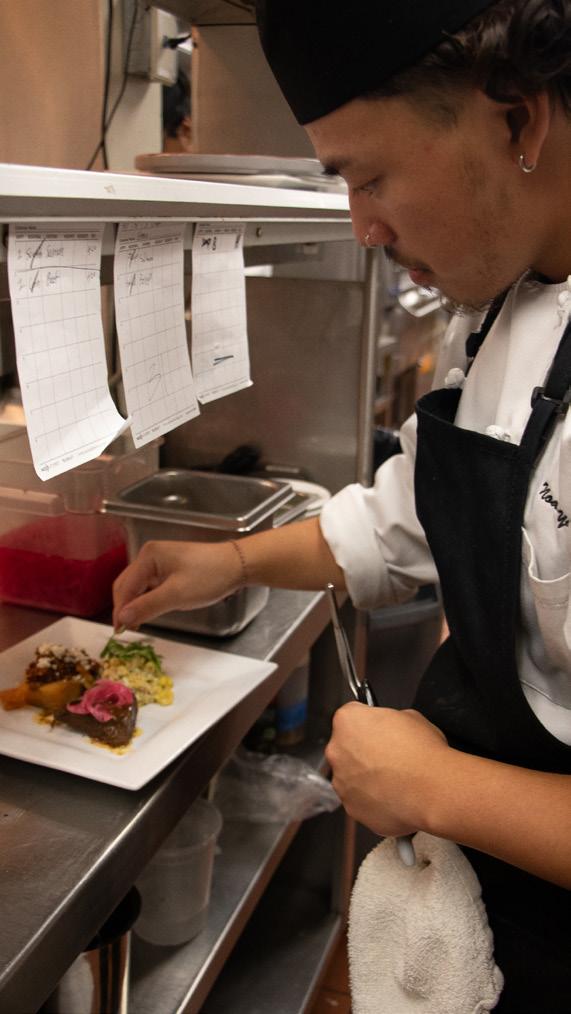
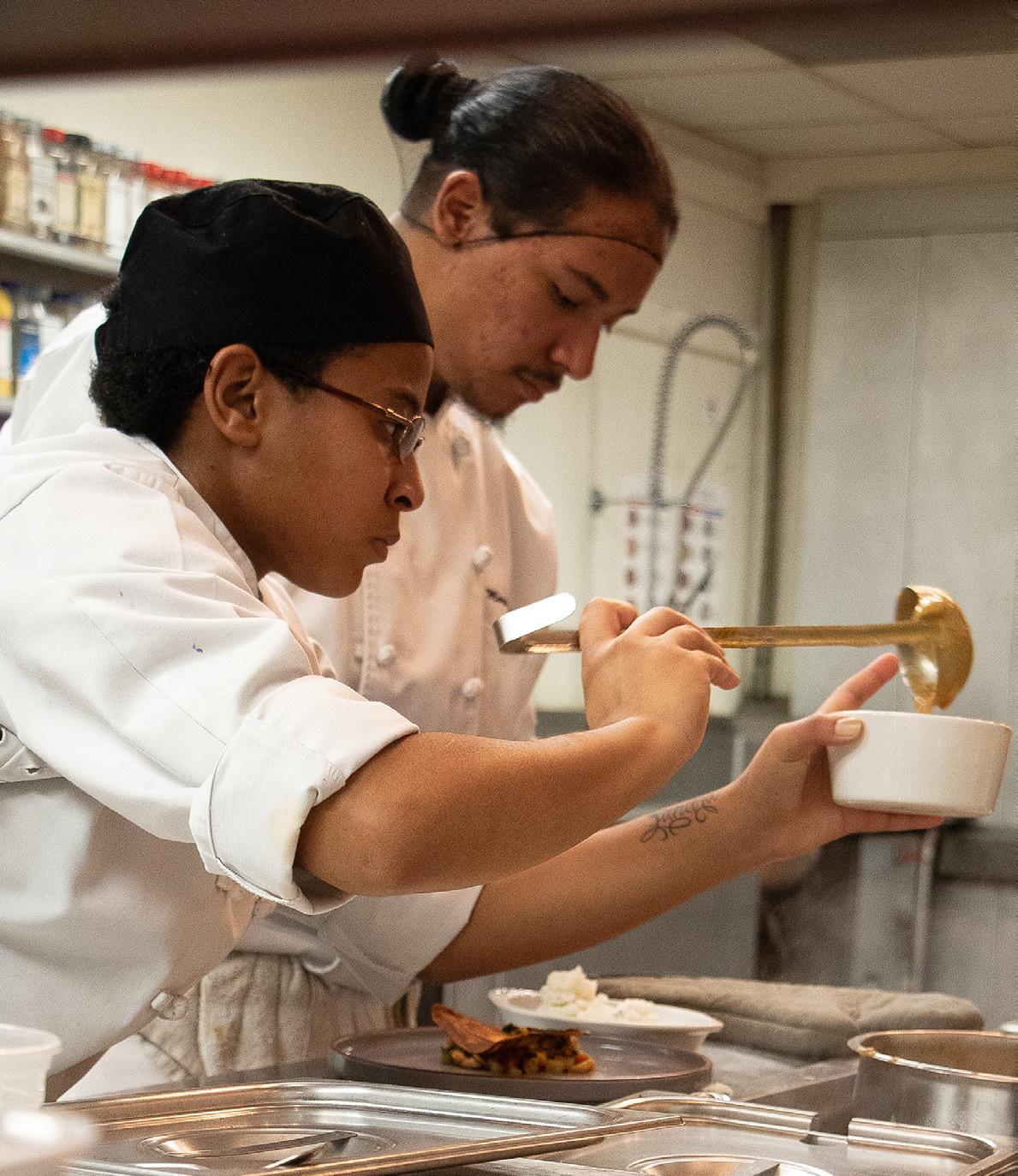
BY
The quad erupted with activity as the EPIC club crossed paths with the Stockton Delta Dance Company (SDDC) during Club Rush on Sept. 12.
While participating in spontaneous choreographed group dances, posing for photos and dancing for TikToks, EPIC Club members held signs inviting attendees to join the Asian-American Pacific Islander (AAPI) focused club. This positivity party isn’t just reserved for the high spirits of Club Rush, but heralds this year’s renewal of EPIC’s mission statement: Empowering Positive Initiatives for Change.
First-time EPIC club president Sydney Tran plans to accomplish this through community bonding events, increased representation and a focus on traditional dance.
“Dance is a form of art and it’s something that I think is very captivating to everyone’s eyes,” said Tran.
Tran’s own experiences learning a Filipino folk dance, models her expectations. “I wasn’t familiar with tinikling last year, but I did it to just get involved and understand and like, appreciate some traditions like the dance,” she said. Tran hopes that by offering dance events and lessons community members will be more likely to get involved and learn about AAPI culture and history.
Tran said EPIC promotes every facet of the AAPI community, even the often overlooked demographics like Pacific Islanders.
“One of our officers is actually Hawaiian, so last year for the AAPI cultural event we actually had her do a Tahitian dance. And I was part of it too. She taught us the dance and we performed it, and this year we’re gonna try to do it
again,” Tran said.
Field trips round out EPIC’s initiative.
Last year the club visited several locations important to the AAPI community, including Angel Island, San Francisco’s Railroad Museum, and Stockton’s own downtown. These trips focus on tradition and culture, but also the AAPI community’s long and arduous history in California and the United States.
“There’s so many different cultures in America and ethnic groups that like, if we don’t preserve it, it can get like, forgotten” Tran said. EPIC and clubs like it are important to the preservation of the U.S. immigration history, both of the positive and not-so-positive aspects of that history. Through events, representation, and dance Tran says of EPIC “We’re representing our community, like, we’re showing face.”
EPIC’s mission is to preserve and celebrate AAPI culture and history, but
being a part of the AAPI community is not required to join.
“We support like, all minority groups,” said Tran. “Our main goal is to support the minority groups. So that includes like, Latinx and the Black community, but anyone can join.”
The catalyst for this mission renewal came from Tran herself.
“I felt like we were disconnected from the club,” said Tran, who was a member of EPIC last year, “This year I really want to make it close-knitted so everyone can like, come back and like, stay involved.”
The first step on this mission? A Boba Bash, happening later this month on Sept. 26, from 12:30 pm - 2:30 p.m. at the Shima Greens.
Tran said EPIC will provide free catered boba in a self-serve format. There will also be a group activity where participants can paint tote bags together.
BY JOE DEMASI Sports Editor
In March, Measure D was approved, officially making Mountain House a city. Many people believe the campus is overdue for permanent buildings and that more programs should be encouraged there.
Currently, the 15-year-old campus features portable classrooms but plans include building structures such as those found at the main Stockton campus. These plans are old as the campus was funded and approved in 2004 but hasn’t changed a bit since.
There is a Cisco Networking Academy in room 301 where you can learn how to build and design computers. The campus also has a student lounge located in room 302A with vending machines and microwaves, they are both open from 8 a.m. to 5 p.m.
Like the main campus, Mountain House has a basic needs center, a district police station, and a library.
Mountain House offers a handful of late start classes as well like BIM 79 Microsoft Outlook which has no prerequisite and teaches students how to use Microsoft Outlook 365. The course starts on Oct. 2, has 7 open seats remaining, and they meet every Tuesday from 5 to 7 p.m. in room 105.
The Dean of the College Center in Mountain House is Pablo Ortega.
Delta College is currently pursuing Measure K, a $598 million bond and if approved, will supposedly help
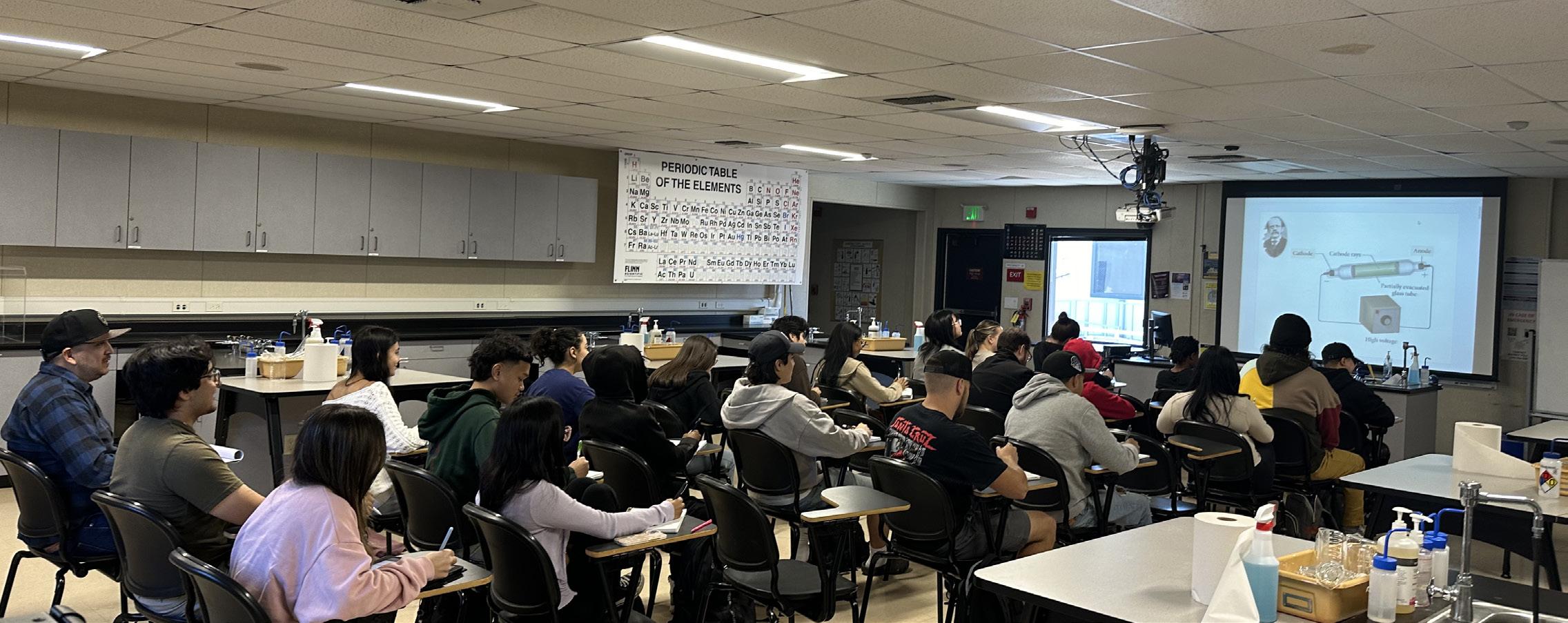
upgrade its campuses by updating old classrooms and improving student and teacher safety. According to Director of Marketing and Communications Alex Breitler, if the bond Measure K passes there will be upgrades to the campus.
“We are updating a Facilities Plan right now and it’s a bit early to say exactly what that permanent building might look like, but it is a high priority if the bond effort is successful,” Breitler said.
Third-year student Nancy Saro says she will support the bond, but it will be hard to convince other people.
“My brother and I are currently enrolled at Delta and both our parents didn’t go to college so it is very important to me that Delta will be able to have the money to upgrade different campuses,” said Saro. “Not everybody is a student and with everything being so expensive people may vote no on an upgrade to their taxes if they aren’t affected by it.”
She also says that the Mountain House campus is a good commuter school, which is good for students like her who are in their last year.
Second-year student Miguel Juarez says he isn’t surprised Delta plans to
upgrade the classrooms and praises the drive.
“I live pretty far from the campus in Stockton so I find it easy to commute here because it is right off Highway 205. I’ve always liked the small campus feel of coming here, but it doesn’t surprise me that they plan to upgrade [the] campus. There is a lot of space around here and the drive isn’t bad for people who live in the Bay Area or around Tracy.” Juarez said. “I’ve never been to the student lounge but I enjoy spending time with my friends in the computer lab.”
BY KIEMA GARRETT Staff Writer
San Joaquin Delta College’s Goleman Library recently expanded its resources with the introduction of the new Academic Computing Lab (ACL) on its first floor.
Before the lab’s relocation to the Goleman Library, it was housed on the second floor of Danner Hall, known informally as “the attic.”
This newly established add-on to the facility could be a game-changer for students, offering a wealth of technological support and academic assistance at no cost.
The ACL is a hub of technological resources equipped with 30 desktops and 60 laptops preloaded with essential software programs commonly used in
Delta’s courses.
“We’ve recently upgraded to Microsoft Office 2021 and installed the Adobe Suite on our desktops and select laptops. This ensures students have access to the latest tools for their coursework, especially those who may not have these programs at home,” Substitute Instructional Support Assistant II Ryan Aran said.
The software upgrade is one aspect of what makes the ACL an essential resource. The lab offers a variety of practical services.
Instructional Support Assistant III
Jerry Sam said the lab also features free printing, scanning, and copying. The library also features 12 group student rooms designed for collaborative work or tutorings sessions.
“Having access to all these services without additional cost is a huge benefit
for students,” Aran adds.
The lab’s no cost services are further enhanced by its unique operational structure. Although the ACL is housed within the Goleman Library, it operates as a separate entity, functioning with its own distinct resources and services.
Unlike the library, which requires a library card for checking out books, the computing lab does not require a card. Students simply need to log in with their student credentials to access the lab’s resources, making it an accessible and user-friendly space.
“The move to the first floor of the library significantly increases our visibility and accessibility. The library is a central spot that students frequent… Being in this high-traffic area allows us to better inform students about the resources available to them,” said Aran.
The co-location of the ACL with the Goleman Tutoring Center also offers added convenience. Students can easily transition from tutoring sessions to the lab to print assignments or get additional help.
“It’s a great synergy. Students can come for a tutoring appointment and then move just a few steps away to utilize the lab’s resources or get further assistance with their assignments,” said Instructional Support Assistant III Hannah Abramson.
Student feedback highlights the positive impact of the new lab. “I think it’s pretty cool. I’m able to print papers when I need to,” Delta student Xavier Beyer said. “It also helps that it’s free.”
Lab hours are Monday through Thursday from 7:30 a.m. to 8:30 p.m., and Friday from 7:30 a.m. to 5 p.m.
How
BY ZACKARY KIRK-NEWTON Managing Editor
Doyou need an excuse to get to gether with your friends that isn’t Korean BBQ or drilling holes in oil pipelines? Have you ever dreamt of being an ad venturer, seeing distant lands that defy logic, or punching things really really hard?
If you have tabletop role-playing games (TTRPGs) may be the cure for all that ails you. A TTRPG is primarily played through the describing of actions and dice rolls to determine outcomes of “skill checks.”
If you’ve got a couple of friends who have six hours every Thursday burning a hole in their pockets, you might be curious where to start, well with a new edition coming out later this year it’s never been a better time to pick up D&D.
play a critical role
campaign. It’s typical fantasy fare with goblins, wizards, and demons, including some stuff cribbed from Tolkien in true

This aesthetic familiarity assists new players, as someone coming in will likely already have a vague idea of the kind of character they want to make based purely on cultural osmosis.
A quick search of “how to make (insert character) in D&D” will have you spoiled for
any task in session. How likely are you to hit an opponent? Decided by either your strength or your dexterity. How likely are you to con vince this guard to let you pass without pay ing a fee? That’s dictated by charisma.

Aesthetically, “Dungeons and Dragons” pulls heavily from every fantasy film you’ve ever watched — or more accurately, most modern fantasy films probably started as somebody’s D&D
When making a char acter in D&D you first choose a species and a class. Your species and class will give you bonuses to certain stats and abilities you’ll be able to use in and out of combat. While you may acquire bonuses to some stats, ultimate ly your stat totals are generated by rolling dice. Your stats influence how likely you are to succeed on

While daunting at first D&D is actually quite easy to pick up as a play er, the position of the dungeon master (DM) or game master (GM) is an en tirely different beast with them being responsible for planning out story beats and organizing combat. While it’s possible to play a campaign and learn the art of being a DM as you go it is usually best to try and find an experienced DM to start. Can’t find a place to host your game? Well luckily for you there are plenty of places to do it online. Roll20 roll20.net/welcome) is one of the more common and importantly free options while also being able to host a myriad of other systems aside from D&D. So even if you can’t get together in person you
developed by Larian Studios that has been able to scratch the itch for a lot of people. It’s about sixty dollars but it’s a pretty good substitute for the real thing, in a pinch at least. However , it might have the opposite effect and make you want to play real D&D even more. Even if it might not seem like your thing or you’re intimidated by the thought of having to act out scenes with your friends, you should give D&D a try. It’s never been an easier time, and if there is anything that the last few years of big budget comic book adaptations and blockbuster anime movies have taught us, what’s good for the geek is often good for the gander.
BY DOMINICK DELISE Managing Editor
Shows are typically not a medium to seek solace in, or something that we innately soak up for valuable insight into our lives.
We watch to pass the time, serving as background noise to break silence, but when Jim finally kisses Pam, or when Jesse Pinkman finally garners the courage to stand up to Walter White, there’s a lesson to be learned there.
Students at Delta, like Taesean Patrick Myles and Mathias McClain, share that their connection to TV shows provide a deeper meaning than what we might be privy to as typical viewers.
Miles said that his favorite TV show growing up was “Total Drama Island.”
“It normalized all the different types of people I might meet. There’s a lot of
out there characters in the show, and there’s a lot of out there situations I might get into. It influenced my sense of humor too,” said Myles.
McClain said his favorite show is “Rick and Morty.” He explained that he was able to connect to more than what was on the surface of the dimension traveling nihilistic alcoholic Rick Sanchez.
“I learned how to do more free thinking, and not just follow along with everybody else. It was very clear about what needed to be done, it was more natural...not direct,” said McClain.
Another example of shows displaying psychological realism can be seen in the Adult Swim show “Smiling Friends.”
The pilot episode features a man, Desmond, who needs smiling. He’s depressed, and it’s obvious he’s ready to
give up because he’s literally holding a gun to his head the entire episode.
The two main characters, Charlie and Pim, try to make him smile by showing him the joys of life: family, friends, and amusement parks. Desmond still doesn’t care and he’s ready to give up.
Pim is cheery, happy about everything, and striving to change Desmond despite the obvious.
Desmond’s best and ironically most funny line from the episode is, “are the best parts of life really just momentary distractions to keep yourself busy so you don’t think of the harsh realities of life for a second?”
Charlie knows this guy is a lost cause, and takes him to sign papers that say that they couldn’t make him smile.
As the characters enter the building, a tiny monster that’s been terrorizing
the rest of the smiling friends’ company staff runs towards Desmond. Desmond shoots the monster and then, in hilarious fashion, finds his calling and finally, smiles.
Most of that sounds pretty silly and downright ridiculous, but when you think about it, Pim and Desmond represent two schools of thought when approaching an outlook on life.
You can be Desmond: a cynic, who refuses to find joy in anything, even when times are fun. Or you can be Pim: positive, cheery and optimistic.
This episode also displays without that guidance, a purpose, or sense of fulfillment, we all can feel like Desmond from time to time.
“Everything has a certain meaning behind it. Things are always different to somebody else,” said McClain.
BY LORIANA JOSE Staff Writer
DeltaCollege students come from all different walks of life but one challenge many can agree on is that the cost of textbooks puts a financial strain on their budget.
In some cases, the cost of required materials directly affects ability to succeed in class. As more professors steer away from traditional textbooks and implement Open Educational Resources (OERs), free or low cost alternatives, students have one less obstacle.
Textbook price and availability are the two most common complaints heard in the bookstore.
According to Textbook Specialist Matthew De La Torre, students nurse a grievance toward the price of textbooks. “Some books are hundreds of dollars… I’ve seen single books go for
$250 to $300 so students go for the cheapest option when available like rentals or ebooks,” said De La Torre.
One of the biggest problems traditional textbooks pose is that the cost forces students to choose between buying books or covering other expenses.
For students that work to pay for their expenses, the cost of required material can add up quickly. Student
Kaleb De La Cruz spends on average $250 a semester on required class materials. “It sucks but it is the price of education… but OER’s would alleviate the financial burden of books,” he said.
Bookstore Staff Member Kayla Mills said one of the strongest criticism she hears at work regarding textbooks is about availability.
“Not every professor sends in their book list on time so there was a lot of books we didn’t have in stock and
students were very upset they couldn’t get it by the time they needed it …that happens a lot,” said Mills.
Not being able to access material because of the bookstore’s limited resources or the students’ limited financial resources can often lead to students quickly falling behind.
De La Cruz noted an event of a classmate falling behind in his computer science course because the classmate wasn’t able to afford and access the required material for nearly four weeks, which set the classmate a month behind. “Now he has to work twice as hard to play catch up,” said De La Cruz.
More instructors are implementing free or low cost alternatives in their curriculum, which is leveling the playing field for students.“The last few semesters we have had more professors say they are giving students free access
BY KIEMA GARRETT Senior Staff Writer
Parkingat Delta has become more than just a matter of securing a permit, it’s about dodging deep potholes and driving on uneven roads that could easily damage vehicles.
Students are now required to purchase parking permits to use the campus lots, yet the condition of the lots raises a critical question: Why are we paying for parking permits when the lots themselves are filled with hazards?
Delta counts 20 parking lots on the Stockton campus alone, with about 5,000 parking spaces. Parking availability is essential for a campus that serves thousands of students daily, yet it comes with a cost — literally.
“It’s sort of hard to justify paying for parking when there are potholes everywhere,” said student Gonzalo Ordinola. Director of Facilities Planning and Management Stacy Pinola addressed these concerns by explaining the primary causes of the potholes.
“The lack of maintenance and seal coating has caused
the potholes that we are experiencing,” she said.
Sgt. Jim Bock of Delta’s District Police Department added that weather conditions have further exacerbated the problem.
“Part of the problem came into play the last two years where we had those massive rainfalls,” he said. “If you have a small pothole and you get this deluge, water gets into all the cracks and starts eroding the soil underneath the asphalt, creating a bigger pothole.”
The parking lots on campus, particularly Shima, are dotted with several deep potholes, as well as numerous smaller ones. These potholes pose more than just an inconvenience, they can potentially cause damage to vehicles.
Potholes and uneven surfaces are known to damage tires, suspension systems, and vehicle alignment, which can lead to costly repairs, further burdening students already dealing with the rising costs of education and living expenses.
Bock acknowledged the safety risks posed by the potholes.
“For us, the potholes definitely pose a safety risk, whether it’s someone swerving to avoid them or hitting one and damaging their car,” Bock said.
There have been upgrades happening all over campus: the Goleman Library has been upgraded with a new computer lab, the campus added workout equipment stations outdoors, and even the pond has been revitalized, but the parking lots remain a patchwork of uneven surfaces and dangerous potholes.
The Facilities department has received concerns about the state of the parking lots, and Pinola assures that the issues are being tracked and addressed when possible.
“Yes, we have received feedback from the campus community, and we do our best to address each of the concerns,” she said. “We are currently working on an emergency purchase order to resolve the potholes until full funding is available to fully repair the parking lots… we are trying for the end of September to fill the potholes. We are working on getting the necessary quotes to push the work forward,” Pinola said.
Pinola also mentions that when renovations begin, students and staff would need to park elsewhere on campus. She emphasized that commu-
to the books,” said Mills.
Furthermore, when picking classes in MyDelta course scheduler students are able to see what classes offer zero-cost or low-cost textbooks. This feature assists students in making the choice of which class best suits their needs.
An increasing number of instructors at Delta College are making the switch from traditional textbooks to offering free and low-cost reading and learning material to their students. Instead of unintentionally leaving the students with no ability to purchase materials behind, these professors are putting their students on equal ground in the classroom.
Widespread adoption of Open Educational Resources (OER’s) is one small step toward equity in education and one giant leap for making higher education accessible to all, regardless of financial background and standing.
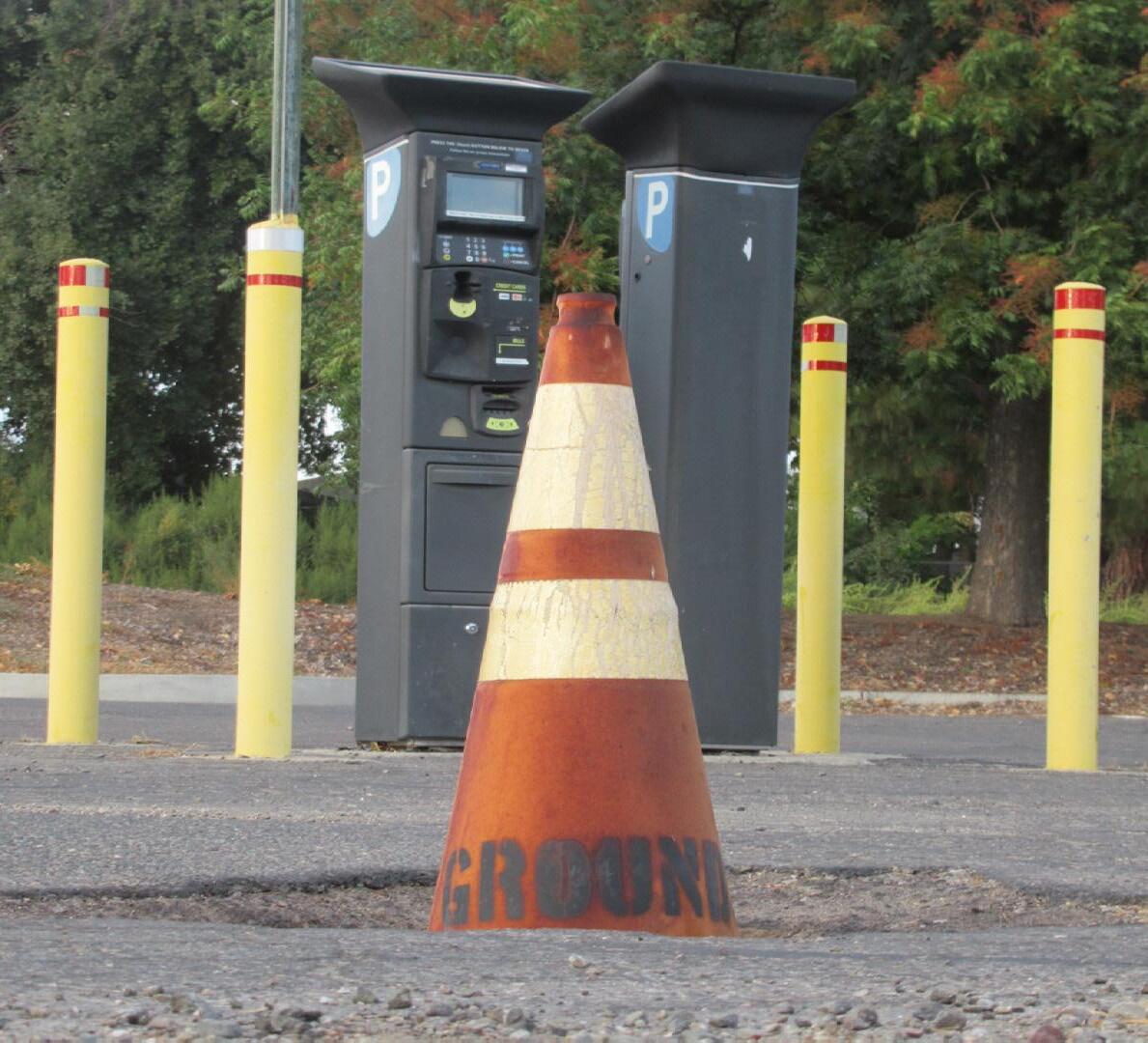
nication will be key to minimizing inconvenience.
Surely, maintaining the parking lots should be considered important, given that it affects almost everyone who sets foot on campus. However, budget constraints pose a challenge.
“Budget resources are challenging, as there are always competing needs. The needs for the students always come first, therefore what is needed for instructional purposes tips
the scale for available funds toward instructional and not parking lots,” Pinola said.
Bock points out parking permit revenue also supports maintenance and safety measures.
“The funds collected from parking permits aren’t just for fixing potholes,” he said. “They help ensure the general functioning and safety of the parking lots, including lighting, surveillance, and regular maintenance.”
BY NADAR WILLIAMS Staff Writer
Emily Vickers is a rising sophomore volleyball player that is majoring in math and science making a stand-out impact with her court play. In her first year here at Delta she put up stats of 1.29 kills per set, 1.98 hitting percent 2.43 digs per set.
After a stellar high school career and a very impressive first year at Delta, Vickers and the Mustangs have started the season hot with a 12-1 start. So far this season Vickers has put up numbers of 3.58 kills per set, 2.88 hitting percent and 2.61 digs per set. Right now she is leading Delta with 136 kills as well as second in digs with 99.
Vickers has done so well recently even got the attention of the state and became one of the examples of how to lead a team here. With the Mustangs hot start the girls opened up the season with 9 game winning streak beating teams American River, De Anza and Taft most recently.
In early September, Vickers was named as one of two All Tournament players for the Delta Classic Tournament. Teammate Kyra Saiers also earned the distinction. Out of all of the teams that played the best players in the tournament are put on a performance team.
The hard work is leading to a roll of wins as the Mustangs head into a two game away run with one stop at home during this time. Where the schedule looks like Diablo Valley, American River and Sierra.
In week three of the volleyball season Vickers’s recognition as State Player of the Week which covers the entire state of California. They serve as both a confidence booster and a reminder of the competitive nature of college volleyball. “State Player of the Week is confidence boosting but me and my team know we have to still be working hard and that everyone we play is going to play us at their best,” Vikers said.
She said her volleyball journey started in the fifth grade. She played seven years of club volleyball as well as in high school at Escalon High School, where the Cougars made it to section three times during her tenure with the team.
That success as well as the high level of competition meant for a smooth transition to college-level play. “Having 11 freshmen last year created a learning environment where we could all grow together,” Vickers said. Also help a big part for team development.
Vickers credits her impactful play last season, as well as her stint on the college’s beach volleyball team, with help-
ing increase her vertical and overall agility. When asked about changing the culture here at Delta”I think Delta has always had a winning Culture me and my team want to expand on that put our best foot forward.” Vickers says.
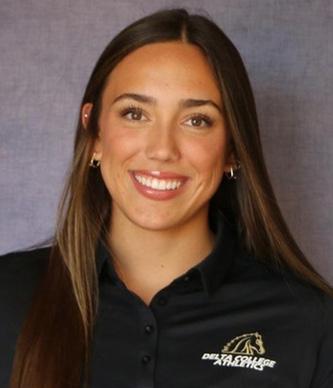
Vickers was inspired by her older sister Kylee Vickers and the success she has a reason to join the Mustangs.
“My sister’s time at Delta in 2017 was a major influence on my decision to come here. Delta’s program has a reputation for excellence, and I wanted to be a part of that,” she said.
Delta’s program as well as the coaching prestige of Head Coach Molly Hummel known as one of the best around at what she does in the coaching game played a heavy role in the decision.
Vickers has made strides this season particularly in the front row where she said she is an undersized hitter whose enhanced ability to play in high-pressure situations has been crucial for Delta recently. In a game against Lassen Community College on Sept. 11, 2024. Vickers racked up 10 kills against Lassen Cougars.
Vickers and her team are determined to build on previous achievements. Vickers values her teammates deeply, noting that their support is a key factor in her enjoyment and success.
“My teammates are my best friends both on and off the court. We push each other to be our best,” she said. “My favorite part about Delta is definitely my teammates. I love them so much and they make coming to practice so easy,” she said.
This supportive environment, coupled with the guidance of Hummel, has been instrumental in her growth, she said.
When asked about the support of the fans at Delta “We appreciate them coming to the games we depend on their energy and we love them,” Vickers said.
BY JOE DEMASI Sports Editor
Roderick Townsend won his third consecutive gold medal in the T47 high jump at the 2024 Paralympic Games. Born in Stockton, he has set numerous high jump records and earned medals in the long jump.
In the Paralympics, there are different categories based on the severity of the athlete’s disability. The T47 category is for athletes who have low movement in one arm or have lost part of their arm.
Townsend was born with nerve damage to his right arm and shoulder. He attended Lincoln High School before competing here and becoming an All-American, which eventually led to his transfer to Boise State, where he earned a degree in communications.
On Sunday, Sept. 1
Townsend won gold in Paris and set a record for high jump, jumping at 2.17 meters high (6 feet, 11.5 inches).
After winning two gold medals in Rio, the ESPYS nominated Townsend for Best Male Athlete with a Disability. He also mentors other paralympic athletes and was an assistant coach for jumpers at Northern Arizona University.
Unfortunately due to his busy schedule, Townsend couldn’t give his time for an interview but a variety of students gave their opinions on his time here and his journey.
Student athlete Jesus Martinez says that Townsend’s determination and discipline inspired him.
“His story inspired me for
sure, he was probably told so much as a kid that he couldn’t achieve what he wanted to because of his disability. I love how determined he is, nothing could’ve stopped him from achieving what he desired. You have to have discipline to do anything in track and field so I admire his commitment.”
Martinez said “I liked his hairstyle in Paris as well reminded me a lot of Dennis Rodman.”
Martinez alluded to Townsend’s colorful hair as it resembled a Picasso painting and looked a lot like ‘90s basketball star Dennis Rodman’s hair.
Townsend’s leadership has been praised by competitors and other athletes playing in different sports.
Business student Wayne
Lew was also impressed by Townsend’s Paris performance and says he hopes he competes more in the future.
“I honestly didn’t know much about Roderick Townsend until I watched him perform this year in Paris. I saw that he was from Stockton and went to Lincoln so I became interested. It takes character to be a mentor to those who you are competing against and I respect that about him.” Lew said. “I hope he competes in L.A. in 2028 because it would be nice for him and his family to enjoy competing in the U.S.”
Lew refers to runner Ezra Frech, a Paralympic gold medalist with a prosthetic leg. He has given credit to Townsend for believing in him and mentoring him ever since he was a
kid. Frech is expected to compete in the 2028 Paralympic games and is enrolled at USC. Townsend and his wife Tynita Townsend recently had a baby boy and he was able to come to Paris. Tynita was a former Olympic high jumper as well so athleticism runs in the family.
Marcus Blackmon is a firstyear student at Delta and didn’t look into Townsend much until seeing him on Delta College’s Instagram account.
“I didn’t know who he was and never watched any Paralympic games until I saw his comment on Delta’s Instagram. He sounded like a very humble guy who hasn’t forgotten where he has come from he definitely has a new fan in me.” Blackmon said.

BY ANDREA RIVERA Editor-in-Chief
Women’s water polo season is off to a splashing start.
The Mustangs won 8-3 against the Merced Blue Devils on Sept. 11 at the Fergusson Pool.
“We love it. But there is always opportunity to grow,” said sophomore utility Ally Ratto about the team’s win.
Delta started the game off sprinting towards mid-pool to gain control of the ball, and quickly attempted to make a goal. However, the Mustangs did not prevail after eight shot attempts and possession of the ball, allowing the Blue Devils to score on freshman goalie Kylie Richardson making the score 2-0 Merced.
Freshman attacker Sami Scheid said
that after the Blue Devils scored, the Mustangs knew they were “a good team and that we have all these qualities that will help us in the long run… we got more energy and intensity and we just started pushing the ball and passing it wherever we saw it open. But we didn’t want to force it, it was just whatever we saw that would be a good opportunity to take.”
By the second quarter the Mustangs had more drive, as they pushed Merced hard resulting in a penalty shot for Delta and immediately after a second shot scored by sophomore attacker Esmeralda De La Torre. This started a rally of points ending the second quarter 4-2 Delta.
Ratto said that this game the Mus-
tangs set a higher standard for themselves, after losing to the Lassen Cougars earlier in the day, and wanted to continue that effort throughout their second game to win.
“Going into the mentality in the second game of let’s compete. Let’s not go down to whatever level they’re playing at, but let’s go at our level and what we play at and what we know what to do,” said Ratto.
The Mustangs made another goal by the third quarter and used the remaining time to block Merced’s shot attempts, however the Blue Devils scored one more time before the time ran out, ending the quarter 5-3.
Delta emerged from the third quarter ready to solidify their win with
three more goals made by De La Torre, freshman attacker Lauryn Lucero and freshman defender Shelby Richardson closing out the game 8-3 Delta.
Head coach Nathan Varosh said about his team’s win, that the team has a lot to work on but they plan on winning the state championship at the end of the season after coming off of their third place overall in the Big 8 conference.
“Win the state championship. Absolutely. All or nothing. We got to continue the work trajectory that we’ve been putting in, we got to continue to grow as a unit. And we need a little magic, but I got a good feeling we’ve got some magic on our side this year,” said Varosh.
BY GURMAN SINGH Staff Writer
On Sept.11 Delta’s volleyball team beat Lassen in a stunning 3-0 victory over, this is the team’s 10th win this season so far.
Delta Mustangs started off strong with a 4-0 lead in the first set, but Lassen kept the game close bringing the score to 10-8, although Delta stayed composed and won the set 25-11.
Lassen began the second set in which they stayed neck and neck with the score of 11-11, but like the first set Delta pulled away again with another set win, with the final score of 25-15.
The Mustangs then carried their momentum into the third set to win the whole game with the final score of 25-17 in the third and final set, making it a breeze for the team as they won 3-0.
Although some players were out due to injury, the Mustangs stayed sharp and didn’t miss a beat in their match against Lassen.
“This group has been through a lot all season, especially with injured players, so having the players get comfortable in different positions and situations is very crucial for us,” said head coach Molly Hummel. “The girls communicated very well with each other as well as serving and passing the ball while being in sync offensively.”
The reigning back to back Big 8 conference champions have their eyes on winning the state tournament this season, where they fell short last season finishing in 5th place.
The Mustangs believes they have some things they can improve on in order to finish the year stronger than they started.
“Moving forward we are working on our energy and communication just like today, especially with two of our starters out. It will help us move forward into our season,” said Emily Vickers, the outside hitter for the team.
“I could work on my back rows and receiving the ball as well, but overall I felt great about my contribution to the team. Especially with our All-American center out,” said Vickers.
Hummel also voiced about having the team continue to communicate in order for this team to continue its success.
“We are working a lot on communication throughout the year and this special group on this team needs to continue doing so to progress into the rest of the season,” said Hummel.